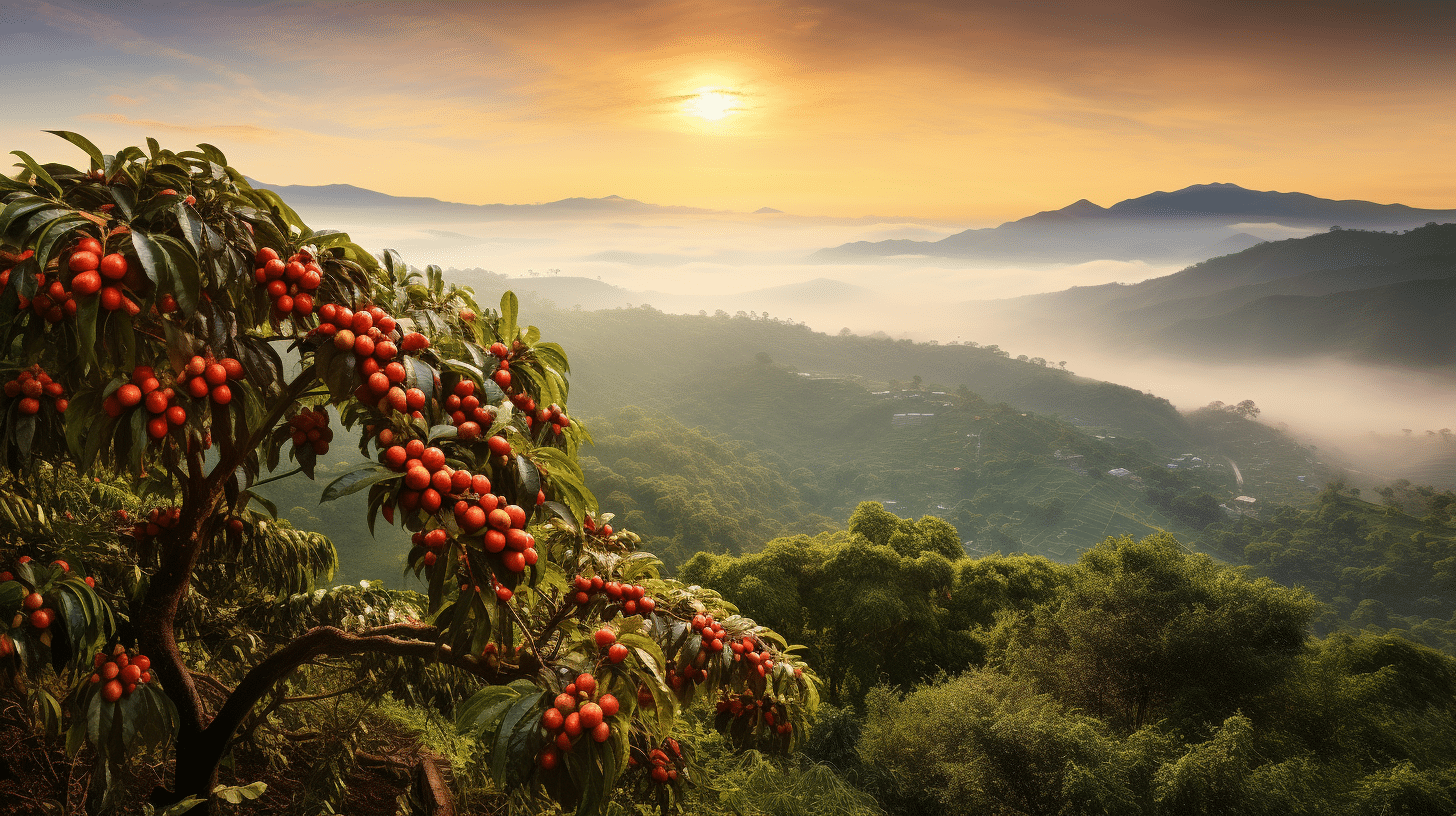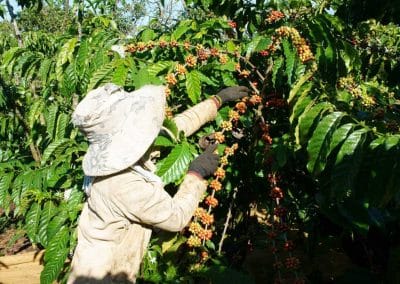Coffee Growing in Guatemala. Coffee, the elixir of life for many, has deep roots in the history of Guatemala. The journey of this intoxicating brew in this Central American country began in the late 18th century. I was first introduced by Jesuit missionaries. Towards the end of the 19th century, coffee had become a formidable force in the nation’s economy. Accounting for a staggering 90% of its exports. This marked the beginning of what would become a thriving industry that today places Guatemala as the 9th largest coffee exporter in the world. It claims an impressive 2.7% share of the global market. This spectacular journey is not only a testament to the country’s agricultural prowess but also an homage to the myriad characteristics that make Guatemalan coffee stand out.
Known for its light acidity that tantalizes the palate, floral notes that intrigue the senses, and a full body that leaves a lasting impression, Guatemalan coffee is a symphony of flavors. It’s fertile volcanic soil, the towering altitudes, and the climate that seems to have been designed for coffee cultivation all come together in a harmonious blend, giving birth to the distinct flavor profile of Guatemalan coffee. This captivating dance of flavors makes Guatemalan coffee a prized possession in the world of coffee connoisseurs.
Guatemalan Coffee Growing Regions and Varieties
Guatemala, a land blessed with diversity in terms of geography, is home to eight prominent coffee-growing regions. Each region, with its unique characteristics, contributes its own verse to the poetic narrative of Guatemalan coffee. These regions are Antigua, Acatenango, Atitlán, Fraijanes Plateau, Nuevo Oriente, Cobán, Huehuetenango, and San Marcos. The specific soil composition, altitude, and climate of each region leave their imprint on the coffee grown there, leading to a rich tapestry of flavors. Antigua, with its nutrient-rich volcanic soil and moderate climate, is known for producing coffee beans that brew into a well-balanced cup, characterized by enchanting cocoa and caramel notes. On the other hand, Huehuetenango, nestled at a high altitude and blessed with a cool climate, gives birth to coffee beans that, when brewed, reveal a bright acidity and fruity flavors.
Exploring the regional variations in Guatemalan coffee is akin to embarking on an epicurean adventure. It is a delightful journey of discovery for coffee lovers. The diversity in Guatemalan coffee extends beyond the regions to the varieties of coffee grown. Guatemala offers coffee connoisseurs a rich selection of coffee varieties including Bourbon, Typica, and Caturra. These varieties each bring their own unique charm to the Guatemalan coffee landscape: – Bourbon: Known for its smooth and sweet taste, Bourbon coffee is like a comforting hug in a cup. – Typica: Valued for its bright acidity and floral aroma, Typica coffee is a sensory delight. – Caturra: A natural mutation of Bourbon, Caturra boasts a rich and full-bodied flavor that leaves a memorable impression.
Coffee Cultivation Process in Guatemala
The cultivation of coffee in Guatemala is a labor of love, a process that demands unwavering dedication. Nestled in the embrace of the Guatemalan soil, coffee trees take three full years to mature. It then begins to bear the precious fruit. When the harvest season arrives, the ripe coffee cherries are handpicked from the trees by families who have made coffee farming their livelihood. This labor-intensive process ensures that only the best cherries, the ones that have achieved the perfect balance of ripeness, are selected. Once the cherries are picked, they set off on the next leg of their journey – the rigorous sorting process.
The first step is sorting by color, a measure taken to weed out any underripe or overripe beans. Starting next, the sorted beans are spread out to dry under the warm Guatemalan sun. As they bask in the sunlight, the beans develop their distinct flavors. The dried beans are then sorted by size to ensure uniformity. Finally, they undergo a final hand-sorting to remove any defective beans. It is a step that ensures that only the highest quality beans make it to the market.
Role of Anacafé and Quality Assurance in Guatemalan Coffee
Anacafé, a trade association established in 1960, is a beacon of support and guidance for Guatemalan coffee farmers. This organization is the guardian of the quality of Guatemalan coffee This ensures that the country’s coffee farmers adhere to the quality standards that have come to define Guatemalan coffee. Anacafé has implemented robust grading systems to assess the quality of the coffee produced by farmers, systems that have become a bulwark against mediocrity. The work done by Anacafé does not stop at implementing grading systems. The organization also provides resources, education, and support to the farmers, helping them navigate the complexities of the coffee industry. This support system plays a pivotal role in maintaining the high standards that Guatemalan coffee is known for. Standards that have solidified its status as one of the finest coffees in the world.
Sustainability and Fair Trade Practices in Guatemalan Coffee Farms
The story of Guatemalan coffee is not just about exceptional coffee; it’s also about sustainable farming practices and fair trade. The Guatemala coffee farms are known for their sustainable and fair trade practices, supporting the livelihoods of local communities. A shining example of this is the Finca Filadelfia Coffee Plantation located in Antigua, Guatemala. This plantation offers coffee tours that not only educate visitors about the coffee production process but also shed light on their commitment to environmental and social responsibility.
Fair trade practices are another cornerstone of the Guatemalan coffee industry. De La Gente, a sustainable and responsible coffee tour operator, underlines the importance of fair trade. They work directly with local coffee farmers, ensuring fair wages and sustainable practices. Choosing to support fair trade, coffee lovers can relish their Guatemalan coffee knowing that it has been produced ethically. It has positively impacted the lives of the farmers who grew it.
Impact of Coffee Industry on Local Communities in Guatemala
The coffee industry in Guatemala is not just about the cultivation and export of coffee; it’s about the profound impact it has on local communities. The industry provides employment opportunities, injects vitality into the local economy, and plays a pivotal role in community development. For many families in Guatemala, coffee farming is more than just a job. It’s their primary source of income, a means to provide for their families and secure their future. The coffee industry also contributes to the development of local communities by investing in infrastructure, education, and healthcare. It creates opportunities for advancement and fosters a sense of community. The significance of coffee in Guatemalan society is deeply ingrained, and it serves as a symbol of their heritage and tradition. The coffee industry not only sustains these communities but also empowers them to thrive and preserve their way of life.
Global Perception and Demand for Guatemalan Coffee
The reputation of Guatemalan coffee has transcended borders and oceans. Earning it a coveted spot in the global coffee market. The unique flavor profiles of Guatemalan coffee, characterized by light acidity, floral notes, and a full body, have bewitched coffee lovers far and wide. Specialty coffee shops, from the bustling cities of the United States to the quaint towns of Europe, are increasingly featuring Guatemalan coffee, a move driven by the demand for this exceptional brew. The global knowledge of Guatemalan coffee as a high-quality and unique product has significantly contributed to its popularity. Coffee lovers worldwide seek out Guatemalan coffee. Not only just for its exceptional taste but also for the story behind each cup.
Global Appreciation for Guatemalan Coffee
The global appreciation for Guatemalan coffee is a testament to the skill, dedication, and passion of the farmers who produce it. In conclusion, Guatemala’s coffee farms are a treasure trove of exceptional coffee. The rich history, unique characteristics, and commitment to quality have earned Guatemalan coffee a spot among the world’s finest coffee producers. From the lush coffee-growing regions to the meticulous cultivation process, every sip of Guatemalan coffee is a testament to the passion and craftsmanship that goes into its production. As the global demand for Guatemalan coffee continues to soar, it’s clear that this Central American nation has rightfully earned its place in the annals of coffee history.
Guatemala coffee is highly acclaimed in the international market due to its flavors and quality. Guatemala coffee farms are known for their sustainable and fair trade practices, supporting the livelihoods of local communities. The coffee growing process in Guatemala is known to be labor-intensive and meticulous. This contributes to the overall quality of the coffee. The rigorous coffee cultivation in Guatemala is a testament to the dedication of its farmers. The diverse coffee varieties in Guatemala, including Bourbon, Typica, and Caturra, each offer unique flavors and characteristics. As the 9th largest exporter, coffee production in Guatemala plays a significant role in the economy.








